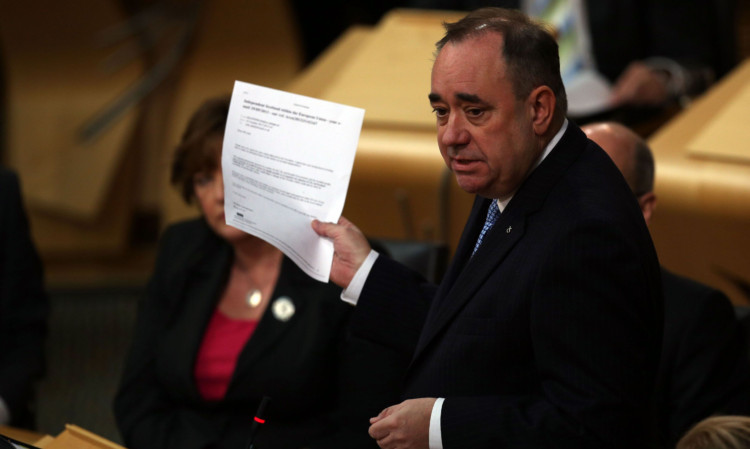
Alex Salmond has called on David Cameron to come clean on the future of Holyrood’s budget amid fears it could be slashed by £4 billion in the event of a No vote.
The First Minister has written to the Prime Minister to see if he backs a Westminster committee’s call for a shake-up of Scotland’s £32 billion annual block grant.
The All Parliamentary Taxation Group wants public cash spread more evenly across the UK, based on where the need is greatest.
But Scotland currently enjoys £1,300 more spending per head on public services such as the NHS and schools than the average UK citizen and experts claim any changes could hit Holyrood spending plans by up to £4bn.
Mr Salmond, who this week launched his White Paper on the consequences of a Yes vote, said it was only fair that Scots are told what could happen if there is a No vote as well.
In a letter to Mr Cameron, the SNP leader said: “One of the consequences of a No vote is that, even with the changes in The Scotland Act (2012), Westminster will continue to control 85% of Scotland’s taxation revenues.
“In order to bring clarity to the debate so that people understand the consequences of a No vote I would be grateful if you would give a guarantee that no future Westminster government will scrap or review the Barnett Formula or cut Scotland’s share of spending.
“Conservative MPs in particular have been vocal in their demands for spending in Scotland to be cut.
“Westminster Parliamentarians are now publicly calling for spending in Scotland to be cut by as much as £4 billion equivalent to £1,600 for every income tax payer in Scotland and the implications of this devastating report for Scotland’s public finances in the event of a No vote could not be clearer.”
The All Parliamentary Taxation Group calls for the Barnett formula, the complex arrangement dating from the 1970s for working out how much Scotland should get from the Treasury, to be scrapped.
It states: “The Barnett Formula must be replaced as a priority, with a needs-based formula for inter-regional resource allocation the best alternative, using the seven indicators of relative need identified by the Holtham Commission.”
The Holtham Commission chairman, Gerald Holtham, concluded in 2010 that Barnett does not allocate resources fairly across the UK and that a move to a more needs-based approach would be better.
At the time he wrote: “An assessment consistent with those used to distribute health, local government and educational spending around England could eventually result in Scotland getting as much as £4bn less than it currently does.”
A spokesman for Prime Minister David Cameron (below) said: “As a string of independent experts have already confirmed, the biggest threat to Scotland’s finances comes from independence.”
Meanwhile, the Scottish Government’s hopes of a fast entry into the EU for an independent Scotland have been dealt a further blow.
Mr Cameron met with the Spanish Prime Minister Mariano Rajoy during a visit to Lithuania, where the two men agreed a separate Scotland would be outside the EU.
The meeting in Vilnius saw the politicians reject the Scottish Government’s assertion that Scotland would join the EU in less than 18 months, subject to a unanimous approval of all member states.
Mr Rajoy was making his second intervention on the issue in the space of three days when he addressed a press conference after Friday’s meeting with the Prime Minister.
He said: “I have spoken with David Cameron about the EU treaties, about what they say in relation to those regions which separate from a member state.
“And they say these regions will leave the EU and become states outside the EU itself.
“He told me effectively that’s how it is and we are aware of what the treaties say. In other words, we noted the fact. “
In an apparent reference to Mr Salmond, he added: “When somebody suggests something, they have the obligation to explain to people the consequences of their decisions. That’s all I am asking for and it is quite reasonable.”

Enjoy the convenience of having The Sunday Post delivered as a digital ePaper straight to your smartphone, tablet or computer.
Subscribe for only £5.49 a month and enjoy all the benefits of the printed paper as a digital replica.
Subscribe